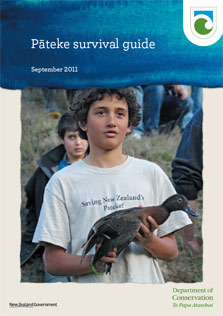Recovery Plan
![]()
The Brown Teal (Pateke) recovery plan is one of a series of recovery plans produced by the Department of Conservation. Recovery plans are statements of the Department’s intentions for the conservation of a particular species of plant or animal, or group of species, plant or animal community for a defined period. Recovery plans focus on the goals and objectives of recovery management, guide the Department in its allocation of resources and are used to raise public awareness of the recovery process.
Each plan has a term of 5-or 10-years.
The purpose of recovery plan is to achieve recovery of that species or group of species by empowering people to understand issues, make sound decisions and minimise uncertainties in the future.
Recovery of a species can be defined as ‘establishing/enhancing multiple populations within the historic range, or at suitable sites, which may or may not require ongoing management’.
| Recovery plans: | |
| Are proactive and operational in nature, focusing on specific key issues, providing direction and identifying roles to managers and technical workers. | |
| Set objectives for the recovery of species and outline measurable actions needed to achieve those objectives. | |
| Are primarily used by Department staff to guide their annual work programmes; however they also provide a forum for planned initiatives with tangata whenua, community interest groups, landowners, researchers and members of the public. | |
| Stimulate the development of best practice techniques and documents, which can be transferable across similar species recovery programmes. | |
A recovery group has been established for Brown Teal. This group consists of people with knowledge of the ecology and management needs of the species. The role of the recovery group is to achieve recovery of the species they represent through generation and provision of high quality technical advice. The recovery group prepared this plan in conjunction with people interested in or affected by this plan, or with an expert knowledge of the species.
Drafts are sent to relevant Conservation Boards for comment and to people or organisations with an interest in conservation management of pateke. Changes to the plan were made as a result of that consultation.
The recovery group will review progress in implementation of this plan and will recommend to Department managers any changes that may be required in management. Comments and suggestions regarding conservation of Brown Teal are welcome and should be directed to the pateke recovery group via any office of the Department or to the Manager, Biodiversity Recovery Unit, PO Box 10-420, Wellington.
The recovery planning process provides opportunities for further consultation between the Department, tangata whenua and others regarding management of this species. Those interested in being more involved in management of pateke or in receiving information should also contact the recovery group.

